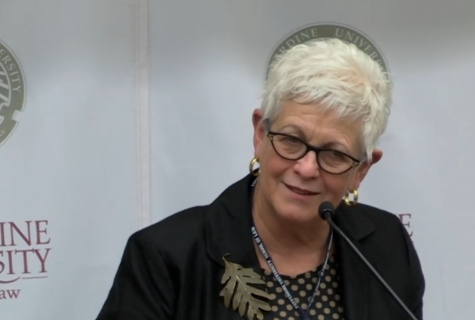Dana Bolger had consulted an Amherst College administrator to find out her options for dealing with the student who sexually assaulted and stalked her in 2011. The official’s advice was simple: Take some time off from school. Go home. Come back after your attacker graduates.
“I felt like a liability, not a student,” she said in the keynote address of a Pepperdine Law conference on domestic violence on U.S. campuses. “Later I would come to realize that the way my dean responded to me that day was part of a larger pattern of administrators seeking to downplay violence, sweep it aside and keep survivors quiet.”
Bolger, a 2014 Amherst graduate who co-founded a survivor-run campaign to stop such attacks, joined an array of advocates and academics for the weekend conference in Malibu, Calif., examining how schools can prevent violence, their responsibilities under federal law and their obligation to student victims.
The name of the organization Bolger leads, Know Your IX, refers to Title IX, the provision in federal law that forbids sex discrimination at U.S. colleges and which courts have interpreted as requiring schools to take measures to prevent violence against women and to respond when such crimes occur.
“While in the past, activists have focused on improving the criminal law to prosecute individual abusers, today’s students have narrowed in on using this civil law to hold entire systems and institutions accountable that are failing us,” said Bolger, who studied law, jurisprudence and social thought.
Though Pepperdine’s conference wasn’t organized in response to recent headlines on domestic violence or campus sex crimes, it garnered heightened interest amid a White House campaign to curb sexual assaults, a high profile domestic violence case involving an NFL player and California’s passage of a law requiring students who have sex to obtain verbal or nonverbal consent beforehand. A partner’s failure to refuse isn’t sufficient.
‘HEADLINES AND CACOPHONY’
While domestic violence on a college campus may not involve two people who live together, the “phenomena and the forces at work are the same,” Jeff Baker, Pepperdine’s director of clinical education and the event’s organizer, said beforehand. “It is still an effort to control someone else by coercion and to exert one’s power over someone else to subjugate them to their will.”
Statistics showing intimate-partner abuse cases on college campuses weren’t immediately available, but the National Coalition Against Domestic Violence reports that such attacks are most common among women 18 to 24 years old, an age range that includes typical undergraduates.
In 2012, the most recent year for which data were available, 1,860 aggravated assaults were reported on university campuses in the U.S., according to records maintained by the U.S. Department of Education. In the five years through 2012, forcible sex offenses jumped 44 percent to 3,637, records show.
“In the shouting of the headlines and the cacophony of who did what, when and who said what, and the videotapes, I think there’s an underlying silence about the legal issues involved, the reporting issues involved,” Pepperdine Law Dean Deanell Tacha said in the conference’s opening. “There’s some very personal angst about what is appropriate, where do we go and how do we respond. We are talking about some of the most intimate relationships that human beings have.”
ACCESS TO EDUCATION
About 20 percent of women were sexually assaulted while in college, most by someone they knew, and only 12 percent reported the crimes, according to a January report by the White House Council on Women and Girls.
“The issues of sexual assault, domestic violence and intimate partner violence are ones that have impacted students on campus for decades, but we are hoping that it is a problem that’s not without an end,” said Anurima Bhargava, the head of the educational opportunities section of the U.S. Department of Justice’s Civil Rights Division. The legal responsibility for schools to protect women under Title IX comes because a survivor’s access to education is diminished afterward: the victim may be too frightened to return to school, for instance, Bhargava said.
“Much of what we have been trying to do recently is have the highlight be on how we can create structural, institutional ways in which we address what’s been going on on campus,” she said.
A comprehensive letter to universities nationwide from the U.S. Education Department outlining its perspective on schools’ responsibilities under Title IX was a step in that direction. The 2011 guidance included examples of how the law might be applied, steps schools might take to prevent sexual violence and enforcement options available to the department.
REPRESENTING VICTIMS
For prevention efforts to succeed, it’s vital that universities make sure the victims of such cases get the support they need, a point made by speakers including Bolger and Kelly Behre, director of the Family Protection and Legal Assistance Clinic at the University of California-Davis School of Law.
In her previous position as a visiting professor at the West Virginia University College of Law, she created a domestic violence law clinic that provided legal advice to student victims unsure about how they wanted to respond.
The impetus came partly from encountering victims who were critical of attorneys, whether it was prosecutors who had declined their cases or defense attorneys seeking to discredit their claims.
“I come from a background of social justice,” Behre said. “I went to law school to save the world, and I thought, ‘Attorneys don’t have to be the problem.’ Different attorneys have different roles. I think most lawyers are doing their job, and they’re well-meaning, but there’s no reason we can’t go in and represent the victim.”
It’s a service she encourages other universities to offer.
By operating the West Virginia clinic, “I was in the unusual situation of being able to say, ‘We’re essentially a law firm. If I have a student who comes to speak with me, that is absolutely confidential, it is absolutely privileged, I don’t have to report anything,’” Behre said. “Which means that I can help a student to think through all of the different options and also be honest about what all those different options entail.”
In Bolger’s case, she took the Amherst administrator’s advice and went home for a semester. She eventually sought resolution of her concerns through the civil legal system, returned to finish her degree and helped start a website for Amherst assault survivors called “It Happens Here.”
In the fall of 2012, after another victim published an account in “The Amherst Student” newspaper criticizing the school’s response to her case, President Carolyn “Biddy” Martin promised reform.
“The administration’s responses to reports have left survivors feeling that they were badly served,” she said in a statement at the time. “That must change, and change immediately.”
Martin formed a committee of students, staff, faculty and others to oversee improvement of the school’s handling of assault cases, improved support for survivors and started a review of penalties for attackers.
“Students all across the country are taking action, and schools, I think, are slowly, slowly changing,” Bolger said. “And yet, we’re not there yet.”
Ultimately, she said, creating societal change will require society working together.
“It’s on you to recognize and dismantle the institutions that tolerate and perpetuate violence,” Bolger said. “If you go to a school that doesn’t expel perpetrators, it’s on you to hold your school accountable for its abuses. It’s on you not to invite rapists to your parties and not to attend theirs. If your favorite sports team shelters abusers and blames survivors, it’s on you to call it out and refuse to support it with your dollars. It’s on you to boycott the actors, musicians and artists that beat up their partners.”
Contact James Langford at (646) 722-2624 or james@lawdragon.com.


